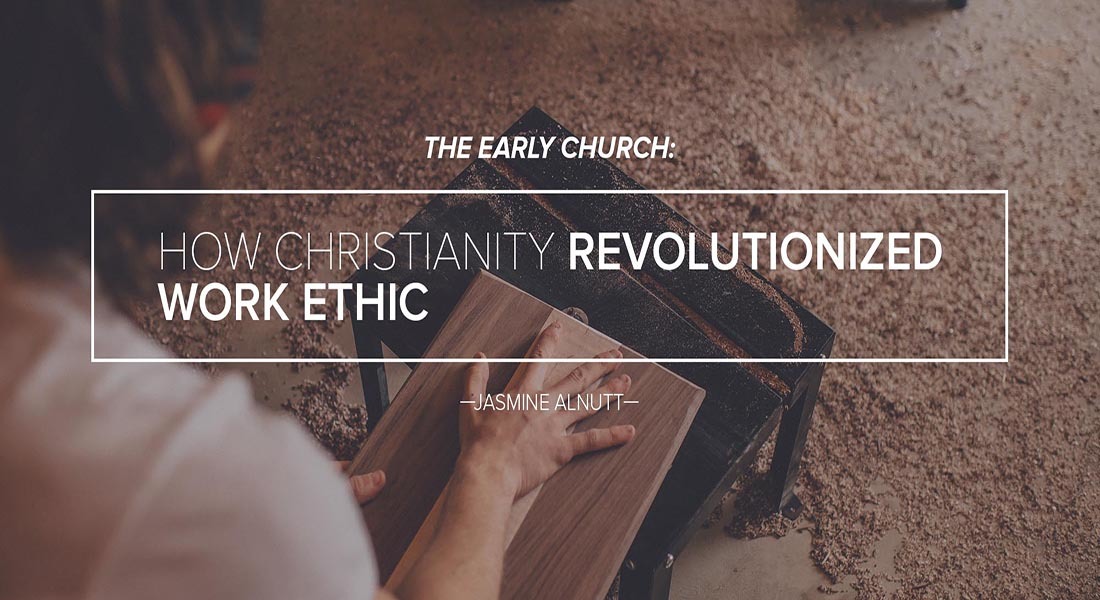
One of the most powerful evidences of a vibrant relationship with Jesus Christ is the fruit that is produced in our lives—the practical outworking of the inward reality of what God has done by His Spirit. James 2:18 challenges, “…Show me your faith without your works, and I will show you my faith by my works!” As we have seen, the Early Church took this exhortation seriously, as they showed their faith by their works to the Roman world around them, powerfully influencing society in practical areas such as the preservation and sanctity of life, sexual morality, and even charity and health care. This month, we conclude our look at early Christian influence with one more very practical issue in Roman society: LABOR and WORK ETHIC.
In the Roman world, manual labor was seen as beneath the philosophers and freeborn citizens, and was strictly for slaves and lower class people.
Not surprisingly, Christians stood out like a sore thumb because they believed that all labor held dignity and honor for all people. Jesus Christ was their example, having Himself been a carpenter, as was the Apostle Paul, an academic and tentmaker whose own testimony to the Thessalonian Christians was that he did not “…Eat anyone’s bread free of charge, but worked with labor and toil night and day, that we might not be a burden to any of you” (2 Thessalonians 3:8). He exhorted these believers to follow his example, saying, “…If a man will not work, he shall not eat.” (2 Thessalonians 3:10).
It is fascinating to note that in so many areas in which Christians were simply obeying God’s Word and living Gospel-centered lives, they ended up influencing society on a greater scale than they might have imagined. This was the case with their work ethic. The fact that early Christians of any background and social standing were willing to undertake all forms of labor markedly affected society.
For one thing, these hard-working Christians altered the class system of the Roman Empire.
Whereas in Roman culture, there were, for the most part, two very distinct classes—rich and poor—Christian workers created a third class somewhere in the middle of these extremes—the middle class! This had never existed prior to the birth of Christianity.
Schmidt notes, “The presence of a middle class in Western societies has rightly been credited with greatly reducing the extent of poverty and its concomitant by-product, disease. It has also been a potent variable in fostering and maintaining political and economic freedom.”¹
Another effect of the Christian work ethic and the dignity Christians gave to labor was that it helped in some measure to weaken the system of slavery in the Roman Empire. By encouraging one another as believers to perform even the most menial tasks (those that only slaves would customarily perform) as unto the Lord, Christians effectually undercut the system of slavery.² In fact, by the end of the fifth century, slavery was on the decline.
Now, we might assume that Christians spoke out against slavery as they would today, but interestingly enough, that was not the case; in fact, many Christians owned slaves themselves, as it was a common practice in that day. However, their view of slaves was certainly different than that of the Greeks and Romans, who regarded slaves as dispensable and often treated them harshly. As the Greek philosopher Aristotle said, “A slave is a living tool, just as a tool is an inanimate slave. Therefore, there can be no friendship with a slave as a slave.”³
By contrast, Christian masters were taught in Paul’s epistles to treat their slaves humanely and lovingly; the Christian belief in the value of human life and the dignity of labor, no doubt, reinforced this principle. What’s more, if a slave was a fellow believer, he or she was to be treated as a Christian brother or sister with the rights and privileges of all believers; in fact, one of the early bishops of the church in Rome was a former slave!
After all, Paul declared that there is neither slave nor free in Christ, and the Early Church attempted to live out that truth.
C.P.S. Clarke noted, “[The Church] introduced no new system of economics or social order as such; but its doctrine of brotherhood and of love to neighbors, of the equality of all in the sight of God, were bound in time to destroy the whole system of slavery.”4 Combined with their strong work ethic, that is exactly what happened! As Christians expressed these biblical doctrines in word and deed, people were drawn into personal relationship with Jesus Christ, which in turn, changed the society around them.
King Solomon wisely observed, “There is nothing new under the sun.” If there is one thing that is demonstrated clearly in the practices and influence of the Early Church, it is that the early Christians encountered many of the same problems and issues that we encounter today; like us, they lived in a culture largely antagonistic to biblical principles and contrary to the life and teaching of Jesus Christ. Yet, as we have seen the dynamic influence of these believers on the world around them through the practical outworking of their inward transformation by the Holy Spirit, may it not only encourage but inspire us to “show our faith by our works,” to bring the love of Jesus Christ and the power of the Gospel to the dark and dying world around us in every area of our lives!
¹Alvin J. Schmidt, How Christianity Changed the World
²Kenneth Scott Latourette, A History of Christianity
³Aristotle, Nichomachean Ethics 8.11
4C.P.S. Clarke, Church History from Nero to Constantine









